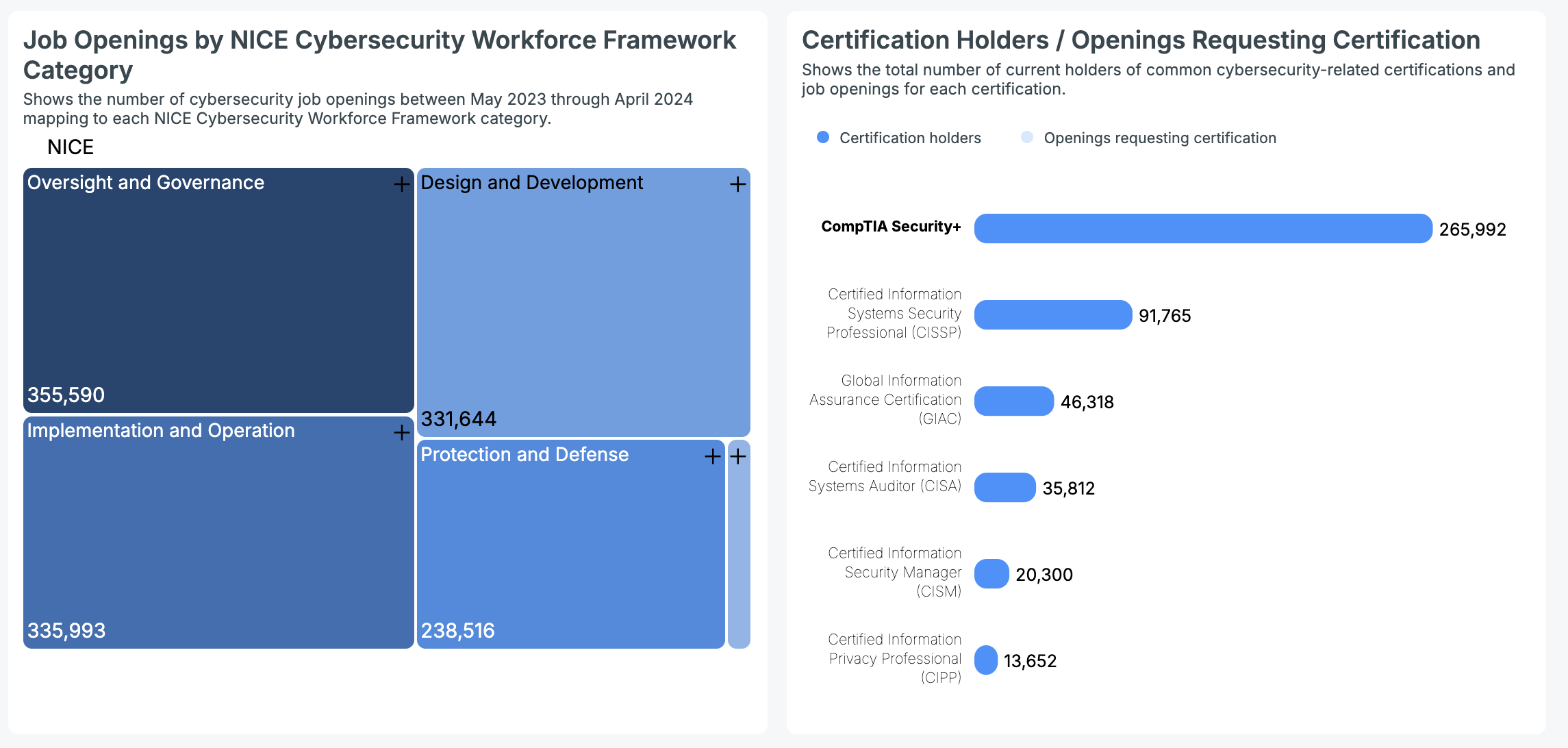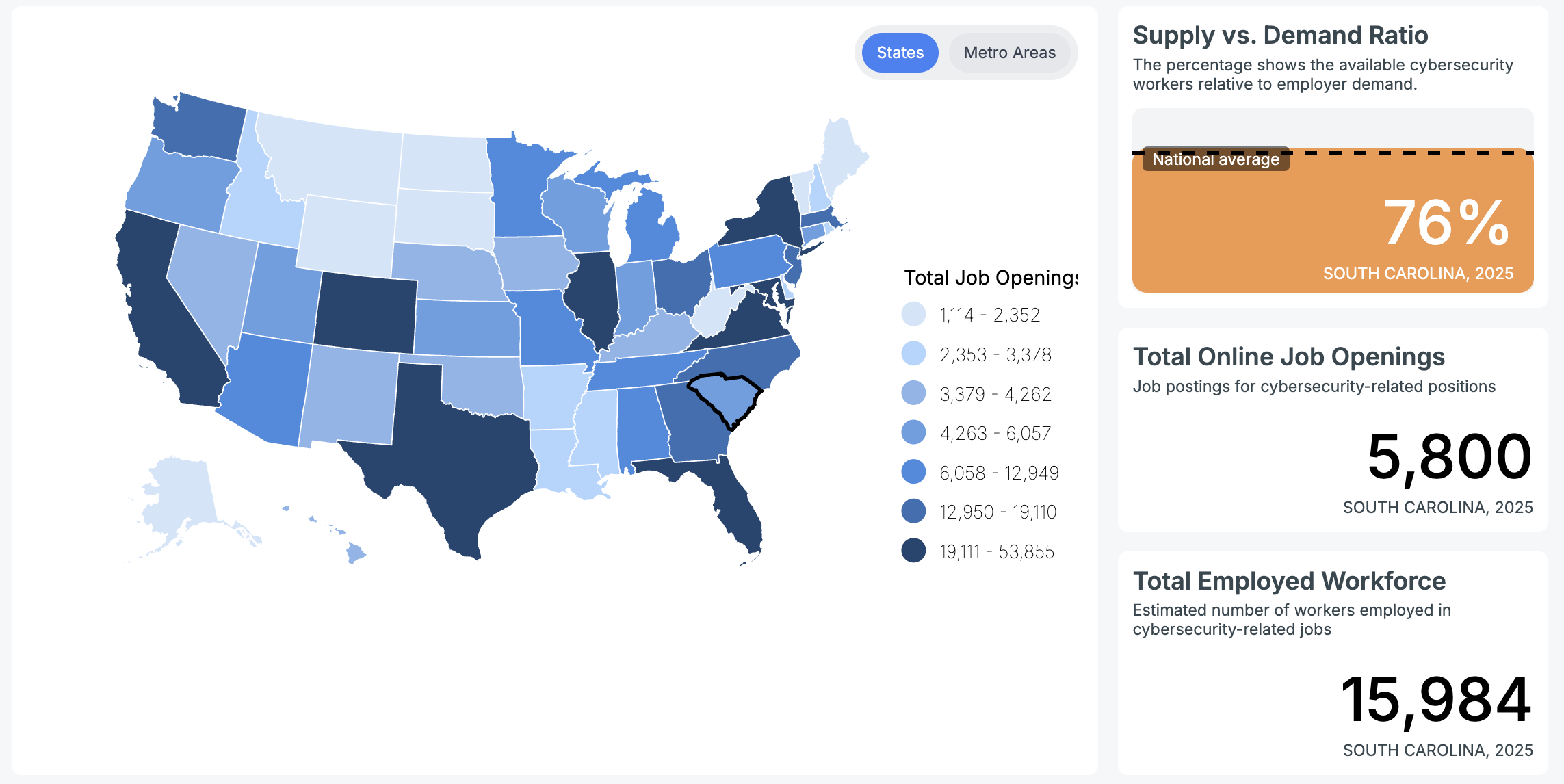- Associate degrees
- Bachelor’s degrees
- Master’s degrees
- Cybersecurity certifications
- Cybersecurity jobs
- Cybersecurity in South Carolina
This guide is all about the cybersecurity educational and career opportunities in South Carolina. The state has a strong manufacturing sector, which translates to an abundance of cybersecurity-related economic activity.
Ad
cybersecurityguide.org is an advertising-supported site. Clicking in this box will show you programs related to your search from schools that compensate us. This compensation does not influence our school rankings, resource guides, or other information published on this site.
Featured Cybersecurity Degree Programs
| School Name | Program | More Info |
|---|---|---|
| Southern New Hampshire University | Online BS in Cybersecurity or Online MS in Cybersecurity | website |
| Keiser University | Online BS in Cybersecurity | website |
| Purdue Global | Online BS in Cybersecurity | website |
| UC Berkeley School of Information | Master’s in Cybersecurity | No GRE/GMAT Required | website |
| University of Maryland Global Campus | Online Bachelor's in Cybersecurity | website |
| Grand Canyon University | Online BS in Cybersecurity or Online MS in Cybersecurity | website |
Accounting for just under $25 billion in annual economic output, the aerospace industry is one of the key drivers of South Carolina’s economy.
“In the past 10 years, aerospace-related companies have announced $2.2 billion in announced investment and over 4,400 new jobs,”
South Carolina’s burgeoning role in the sector is coming at the right time, as analysts are bullish on the aerospace and defense industry, with expectations that it will grow at a 12 percent clip annually over the next five years, from $700 billion last year to more than $1 trillion by 2026, according to the current Aerospace & Defense Global Market Report.
If there is one company that stands above the rest it’s Boeing. In 2009 Boeing decided to locate its final assembly and delivery facility in South Carolina. However, despite the company’s longstanding reputation, the last couple of years have not gone smoothly.
In October 2018, the Lion Air flight went down, calling into question the reliability of Boeing’s new 737 Max. Then in March of 2019, another 737 crash, this time in Ethiopia. The problem: faulty sensors and poorly conceived software.
While these crashes were not directly related to cybersecurity, the rise of software-laden planes is leading to an industry-wide push for increased security.
Even the remote possibility of a flight being downed via hacking, combined with the unfortunate theft of intellectual property in the airline industry, means aerospace cybersecurity has never been more important.
South Carolina thankfully recognizes that, and although it hasn’t acted specifically in regards to the airline manufacturers, the state is doing its part to promote cybersecurity.
Related resources
Cybersecurity overview
In 2018, South Carolina made history by becoming the first state ever to pass a cybersecurity bill mandating that all insurance companies have a proper cybersecurity program to protect against data breaches.
The mandated security program requires regular updates, especially as computer hardware and software systems are upgraded.
The law also dictates that insurance companies must notify regulators within 72 hours of a security breach.
A nonprofit entity established under the South Carolina Nonprofit Organization Code is the South Carolina Cyber Foundation.
Its mission is to advance innovative, smart, and imaginative approaches to unveiling cyber opportunities via educational channels.
The foundation achieves its objectives by organizing various programs and initiatives, including a yearly cybersecurity conference.
The South Carolina Cyber Foundation also serves as the State’s center for cyber education and outreach. One of the cross-platform programs they support is the annual Kids Safe Online MS-ISAC Poster Contest. The contest opens each October 1st.
The University of South Carolina is also promoting cybersecurity awareness. In 2020, they hosted the second annual National Cybersecurity Legal Institute, a conference intended to educate participants about the costs of a data breach.
Data breach costs include lost productivity, exposed trade secrets, lawsuits, and of course, a huge reputational blow. Due to the success of the conference, another one has already been scheduled for this year.
South Carolina is aware of how important it is to keep data safe and systems protected. As such, the state’s educational sector has a robust set of programs for those interested in pursuing a career in cybersecurity.
Cybersecurity associate degrees in South Carolina
An associate’s degree in cybersecurity is a great way to get started on your cybersecurity career. Spartanburg Community College has an associate’s program that consists of 70 credit hours.
See more details below.
- Program: Computer Technology, Networking/Cybersecurity, AAS
Credits: 70
Cost per credit: $204 in state | $415 out of state
Delivery Method: Campus
Learn more: Program details
Students work with different types of operating systems, networking architectures, and personal computer applications.
Lab projects are completed using Cisco networking devices such as switches and routers. Students develop logical thinking, problem-solving, interpersonal, and communication skills.
Cybersecurity bachelor’s degrees in South Carolina
A bachelor’s degree is almost always required to secure a good job in the cybersecurity industry. It will provide the student with a foundational knowledge of cybersecurity best practices, including the ability to identify and neutralize common threats.
In addition to studying the fundamentals of cybersecurity, those pursuing a bachelor’s degree will be exposed to a number of related topics.
Those may include computer science, network infrastructure, and diagnostics as well as programming in one or more languages.
As with almost any other undergraduate degree, students working towards their bachelor’s in cybersecurity will take approximately thirty-five to forty classes for a total of one hundred and twenty credit hours.
Depending on the program, certain classes outside of the degree track, like a second language, might be mandatory.
Campus-based bachelor’s degrees
Currently, there are two campus-based bachelor’s programs available in South Carolina.
- Program: Cybersecurity & Analytics (BS)
CAE designation: CAE-CD
Credits: 121
Cost per credit: $1,817
Delivery Method: Campus
Learn more: Program details - Program: Cybersecurity (BS Degree)
Credits: 125
Cost per credit: $495
Delivery Method: Campus
Learn more: Program details
Either of these degrees will prepare the applicant for an entry-level position within the cybersecurity field or further education with a master’s degree.
Cybersecurity master’s degrees in South Carolina
A master’s degree can provide an edge over the competition. A cybersecurity job candidate with a master’s degree can expect to earn a higher salary as well as enjoy a wider range of employment opportunities.
An employer expects that an employee with a master’s will be able to handle more complex cybersecurity threats and, depending on the company, manage and lead a team. Also, advancement within a company may not be possible without a master’s.
Online master’s degrees
South Carolina has a single online master’s degree, geared specifically toward intelligence and cybersecurity.
- Program: Master of Science in Cybersecurity Management
CAE designation: CAE-CD
Credits: 30
Cost per credit: $565
Delivery Method: Hybrid
GRE/GMAT Required: Not Required
Learn more: Program details
Cybersecurity certifications in South Carolina
Here are the current figures for professionals holding common cybersecurity certifications, as gathered by Cyberseek nationwide:
- CompTIA Security+: 265,992 certification holders
- CISSP: 91,765 certification holders
- GIAC: 46,318 certification holders
- CISA: 35,812 certification holders
- CISM) 20,300 certification holders
- CIPP: 13,652 certification holders

Different cybersecurity positions may require specialized training in a specific field.
As such certifications are a great way to add weight to a resume as well as learn new skills that may prove essential on the job.
South Carolina offers more than a dozen certifications, offered on campus and online.
- Program: Cybersecurity Certificate
Credits : 37
Cost per credit: $194 in state | $331 out of state
Delivery Method: Online
Learn more: Program details - Program: Graduate Certificate in Cybersecurity
Credits: 12
Cost per credit: $626 in state | $1807 out of state
Delivery Method: Campus
Learn more: Program details - Program: Cybersecurity Certification
Credits: 12
Cost per credit: $567 in-state | $1,668 out of state
Delivery Method: Campus
Learn more: Program details - Program: Graduate Certificate in Cybersecurity
Credits: 12
Cost per credit: $574 in state | $1668 out of state
Delivery Method: Campus
Learn more: Program details - Program: Cybersecurity Certificate
Credits: 9
Cost per credit: $395
Delivery Method: Online
Learn more: Program details - Program: Certificate: Applied Science in Cybersecurity
Credits: 33
Cost per credit: $170 in-state | $341 out of state
Delivery Method: Campus
Learn more: Program details - Program: Certificate in Cybersecurity
Credits: 33
Cost per credit: $175 in state | $357 out of state
Delivery Method: Online
Learn more: Program details - Program: Certificate in Cybersecurity
Credits: 27
Cost per credit: $194 in state | $283 out of state
Delivery Method: Hybrid
Learn more: Program details - Program: Networking/Cybersecurity Certificate
Credits: 30
Cost per credit: $204 in state | $415 out of state
Delivery Method: Campus
Learn more: Program details - Program: Cybersecurity Certificate
Credits: 30
Cost per credit: $239 in-state | $445 out of state
Delivery Method: Campus
Learn more: Program details - Program: Graduate Certificate in Cybersecurity
CAE designation: CAE-CD
Credits: 12
Cost per credit: $626 in-state | $1,807 out of state
Delivery Method: Campus
Learn more: Program details - Program: Certificate in Applied Science in Cybersecurity
CAE designation: CAE-CD
Credits: 30
Cost per credit: $189 in-state | $357 out of state
Delivery Method: Campus
Learn more: Program details
Cybersecurity jobs in South Carolina
The demand for cybersecurity talent in the United States remained strong from May 2023 to April 2024. Oversight and Governance jobs led the charge with 355,590 openings.
Not far behind were Implementation and Operation (335,993) and Design and Development (331,644). Protection and Defense roles provided 238,516 opportunities, while Investigation roles added 19,525.
According to Cyberseek‘s data, there are currently 5,800 cybersecurity positions open in South Carolina, with 15,984 people employed in the cybersecurity workforce.

Cybersecurity in South Carolina
In South Carolina, the sky isn’t the limit; it’s the backbone of the state’s economy. The aerospace industry is a massive employer, and like almost every other industry, there is a push towards software automation.
That automation comes at a price, though. The more code, the more susceptible a system is to attack. That’s where the cybersecurity team comes in.
According to a recently conducted global aviation survey,
“The United States places high emphasis on its aviation sector and invests mainly in research and development of advanced cybersecurity systems.”
That research and development is being done by real people and the demand for qualified cybersecurity technicians has never been higher.
With a degree from one of South Carolina’s universities and a good recommendation, a promising career is all but guaranteed.